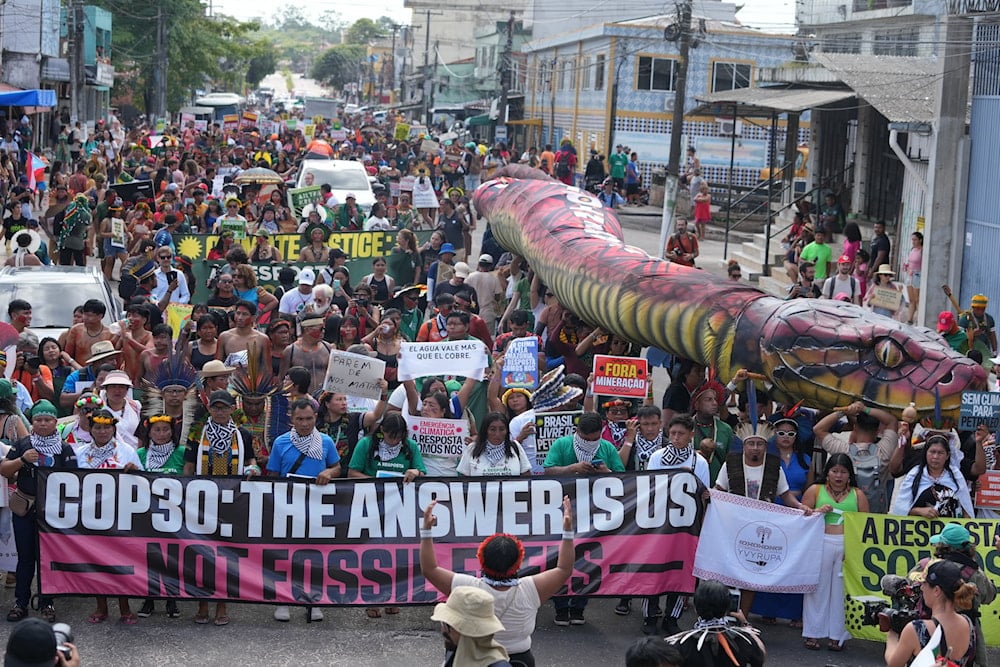More than 300 big agriculture lobbyists took part in COP30
More than 300 industrial agriculture lobbyists joined COP30 in the Amazon, sparking concern over their influence on deforestation and climate negotiations.
-

Activists march at a climate protest during the COP30 UN Climate Summit, on November 17, 2025, in Belem, Brazil. (AP Photo/Andre Penner)
More than 300 lobbyists linked to industrial agriculture are attending this year’s UN climate summit, COP30, in the Brazilian Amazon, a region where cattle ranching and commodity farming remain the leading drivers of deforestation. The scale of their presence has drawn sharp criticism from environmental and Indigenous groups, who warn that agribusiness interests are undermining global efforts to curb the climate catastrophe.
According to a joint investigation by DeSmog and The Guardian, the number of agriculture lobbyists has increased by 14% compared to last year’s summit in Baku and exceeds the size of Canada’s entire delegation. In total, 302 lobbyists represent sectors including cattle, dairy, soy, agrochemicals, and biofuels, many of whom have direct or privileged access to negotiations.
The investigation found that one in four agriculture lobbyists at COP30 are part of official country delegations, while a small group (six individuals) has direct access to negotiation rooms. The meat and dairy sectors sent the largest contingent, with 72 delegates, nearly twice the number representing Jamaica, which was recently devastated by Hurricane Melissa.
By comparison, India, home to over 1.4 billion people, sent 87 delegates to the summit. Bayer, the global pesticide and seed conglomerate, sent 19 lobbyists, the most of any company. JBS, the world’s largest meat producer, sent eight, including CEO Gilberto Tomazoni.
Amazon deforestation and food emissions under scrutiny
Agriculture is responsible for up to a third of global greenhouse gas emissions. In the Amazon, cattle ranching remains the top cause of deforestation, followed by the industrial production of soy, primarily used as animal feed, the investigation revealed.
Scientists warn that deforestation, land clearance, and water stress could push as much as half of the Amazon rainforest past a tipping point by 2050. A 2020 study found that even eliminating fossil fuel use would not keep global warming below 1.5°C if food system emissions remain unchecked.
Biofuels, agrochemicals, and synthetic fertilizers, often marketed as climate solutions, are also under scrutiny. Synthetic fertilizers emit nitrous oxide, a greenhouse gas 300 times more potent than CO₂, and most are derived from fossil fuels.
Environmental and Indigenous leaders have condemned the influence of industrial agriculture at COP30. Vandria Borari of the Borari Kuximawara Indigenous Association said, "More than 300 agribusiness lobbyists occupy the space at COP30 that should belong to the forest peoples. While they talk about energy transition, they release oil into the Amazon basin and privatize rivers like the Tapajós for soy. For us, this is not development, it is violence."
Raj Patel, academic and author of Stuffed and Starved, called the summit “a hostage negotiation over the future of the planet,” adding that corporate lobbyists are “seated at the table as honest brokers” while advancing their own destructive agendas.
Lidy Nacpil of the Asian Peoples’ Movement on Debt and Development warned: "Cop will never deliver real climate action as long as industry lobbyists are allowed to influence governments and negotiators."
Major food corporations seek influence while resisting reform
According to the investigation, many of the participating companies, including JBS, Bayer, Nestlé, and others, have histories of lobbying against environmental reforms. According to Friends of the Earth US, the emissions from the world’s 45 largest meat and dairy companies are equivalent to those of Saudi Arabia, the world’s top oil producer. JBS alone accounts for nearly a quarter of those emissions.
The Meat Institute, representing 350 US meat producers, sent two delegates and has consistently opposed efforts to reduce red meat consumption or mandate emissions disclosures. Nestlé, the Brazilian National Confederation of Agriculture and Livestock (CNA), and the UN climate body did not respond to requests for comment.
In the US alone, agribusiness and associated trade groups spent over half a billion dollars lobbying Congress between 2019 and 2023.
The investigative report argues that while food is not a central theme of COP30, agriculture stands to benefit from multiple discussions, particularly around biofuels. Brazil is advocating for a fourfold increase in biofuel usage, despite recent studies showing that some biofuels may generate 16% more emissions than fossil fuels due to the land-use changes associated with growing crops like corn and soy.
Critics argue that agribusiness, already a major recipient of public subsidies, is positioning itself to receive even greater financial support under the banner of climate solutions.

 4 Min Read
4 Min Read










